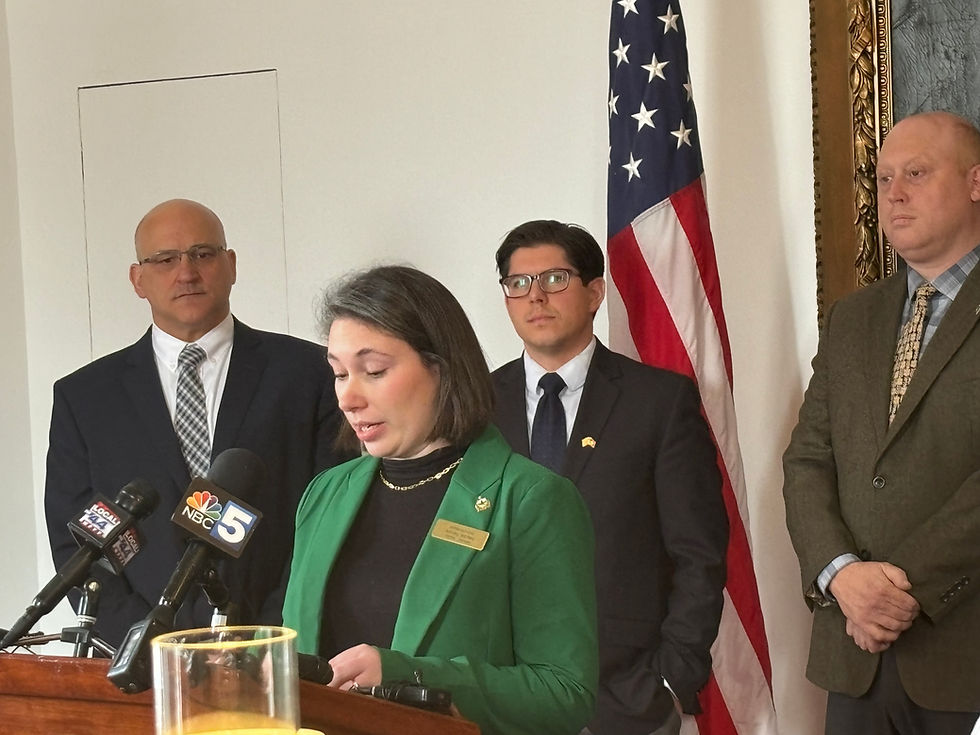Legislative Update: March 13, 2024
- Rep. Ashley Bartley

- Mar 13, 2024
- 4 min read
Updated: Mar 13, 2024
Today, Governor Phil Scott asked Rep. Elder (D) and I to speak at his weekly press conference on the lack of housing reform progress. Below is what I said. The full press conference can be viewed below the speech or by clicking here.
Two months ago, in the early days of this legislative session, I had the privilege of standing alongside a coalition of legislators from across the political spectrum. We gathered under the banner of tri-partisanship with a shared commitment to addressing one of Vermont's most pressing issues: our housing crisis. Joined by Governor Scott, we unveiled a comprehensive housing reform bill, H.719.

The Housing Crisis has permeated every major hurdle facing Vermonters. More inventory would help stem the tide of increasing numbers of people experiencing homelessness. Education funding issues can be helped with an increase in the Grand List across Vermont towns and cities. Our demographic crisis can be resolved by recruiting new Vermonters to fill the thousands of open jobs and contribute to our local economies.
But since mid January when it was introduced, H.719 remains untouched in the House Committee on Environment and Energy and has subsequently died on the committee wall with no interest to take up the bill, despite being sponsored by over 30% of the House.
Simultaneously, another crucial piece of legislation, known as the "BE Home" bill, S.311, took shape in the Senate Economic Development, Housing & General Affairs Committee. That committee did great work and I applaud Senator Ram-Hinsdale’s leadership seeing that bill through.
H.719 and S.311, represent collaborative efforts towards comprehensive housing reform, offering effective solutions. But both bills were sent to committees with Chairs vocal in their desire to not only maintain the status quo in land use and zoning, but as we are seeing in the House, the session has thus far been spent expanding Act 250 jurisdiction and creating further hurdles to development.

Neither bill will meet crossover. The process, enabled by House and Senate leadership, has stunted progress. Not only will S.311 not make crossover, there are plans in the Senate to water down the benefits of S.311 by combining it with a separate land use bill - not a housing bill - that is coming from the House. Effectively ensuring that the House will have no substantive input on any landmark housing legislation.
As a member of the House General and Housing Committee I have struggled with the arbitrary notion that our committee does not have jurisdiction over Act 250 or municipal zoning. Our Committee has been forbidden to discuss any aspect of land use, a struggle that has been shared by several others within our committee. How can we possibly have holistic conversations about housing and legislate effectively when we cannot discuss some factors in housing development?
Planning, land use, and zoning
For decades, we have witnessed a “status quo” approach to the housing crisis. But now, momentum is building across the political spectrum, and we need to act in unison. As we stare down what, in the state house, is called “calendar math” WE CAN STILL GET THIS DONE.
I acknowledge that addressing the Housing Crisis requires a multifaceted approach, and I recognize the valid concerns of my colleagues who argue that Act 250 jurisdictional reform alone won't solve the crisis. I agree. But simply spending more state funds won’t either, we cannot buy our way out of this crisis. That’s why I voted against a bill, that barely passed out of my committee, that proposes to spend nearly $200 million more every year, for ten years. Two billion dollars, taxpayer dollars yet to be funded -- more money thrown at a problem without solving the systemic underlying issues.
To be clear, this administration has already invested more money in housing than any administration in the history of the state -- By far. Since 2020, we've committed over $500 million on initiatives aimed at bringing vacant units online, constructing new homes, and expanding shelter capacity. Despite these efforts, the impact hasn’t been significant enough. We must explore fresh solutions. The legislature has been made aware that there is a need for 40,000 units over the next decade, with construction costs could total over $18 billion at the current rate, addressing this aspect of the housing crisis with every possible tool is crucial.
As I’ve outlined, the process is broken when the voices of the few drown out the collective outcry of the entire state.
Vermonters deserve better. They deserve proactive and earnest efforts from their elected representatives. They deserve transparency and accountability in the legislative process.
I stand before you as a voice for Vermonters, for housing, housing everyone; and I am committed to championing tangible collaborative solutions to our housing crisis.
I urge my colleagues, irrespective of party affiliation, to join forces in this endeavor. It is time for House and Senate Leadership to prioritize the well-being of Vermonters over political posturing and personal agendas. We are at a precipice, where progress and process must be more important than party.
Together, let us rise to the occasion and deliver the meaningful, collaborative housing reform that Vermont so desperately needs.
Thank you.



Comments